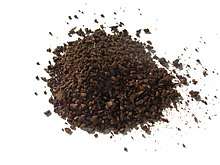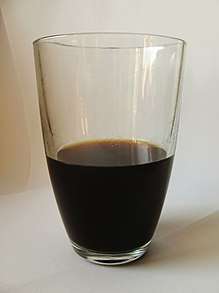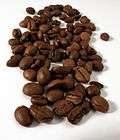Roasted grain drink


A roasted grain drink (also roasted grain beverage and grain coffee) is a hot drink made from one or more cereal grains roasted and commercially processed into crystal or powder form to be reconstituted later in hot water. The product is often marketed as a caffeine-free alternative to coffee and tea, or in other cases where those drinks are scarce or expensive.[1]
Several well-known roasted grain drinks are Nestlé Caro, Postum, and Inka. Other brands can be found at health food stores and at some grocery stores. Some common ingredients include toasted barley, malted barley, rye, chicory, molasses, and beet root.
Use
Asia
Roasted grain drinks are popular in East Asian cuisines—Korea,[2] Japan, and China each having one or more versions (usually roasted grains simply steeped in hot water).
- Barley tea (bori-cha, dàmài-chá, mugi-cha)
- Rice tea
- Brown rice tea (hyeonmi-cha, nước gạo lứt)
- Sungnyung
- Corn tea (oksusu-cha)
- Job's tears tea (yulmu-cha)
Grain-like seeds and pseudocereals are used to make similar drinks.
- Buckwheat tea (memil-cha, soba-cha)
- Sicklepod tea (gyeolmyeongja-cha)
Grain teas can also be blended with green tea or other tea drinks.
- Brown rice green tea (hyeonmi-nokcha)
Europe
Some notable Polish brands which specialize in roasted grain coffee are Inka, Krakus and Anatol.
Often, under communist rule in the Soviet Union and in countries of the Eastern Bloc, hot grain drinks served as a substitute for coffee during perpetual shortages, allegedly caused by Western trade embargoes, according to local government claims.
Safety
Acrylamide is found at high levels in dark-colored baked, roasted and fried high-carbohydrate foods, as well as in roasted coffee and barbecued meat. The dark-roasted grains used in roasted grain drinks would also, presumably, have high levels of acrylamide. The substance has raised health concerns but it is not clear whether acrylamide consumption affects people's risk of getting cancer.[3]
See also
References
- ↑ Yvona Fast, "Kicking the Coffee Habit: Going Caffeine-Free with Grain-Based Beverages", E–The Environmental Magazine, May 1, 2010 – via HighBeam Research (subscription required) .
- ↑ Alex Jung, "20 delicious Korean drinks", CNN.com, October 13, 2011.
- ↑ "Acrylamide and Cancer Risk". cancer.org. American Cancer Society. 10 March 2016. Retrieved 29 January 2017.
